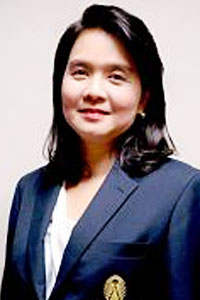
Thailand's 1997 constitution was widely praised as the "People's Charter" for unprecedented public participation in the drafting process while the 2007 constitution was dubbed by some as the "de-Thaksinisation edict" as it was drafted after the 2006 coup that ousted then prime minister Thaksin Shinawatra.
The latest, the 2016 draft constitution that is due for a national referendum on Sunday, is touted as the "anti-corruption" charter as the prevailing discourse in its promotional campaign has been revolving around this theme.
In the series of government-sponsored pre-referendum campaigns which appear in the mass media in various forms -- from advertising spots to ballads -- the recurring story line has been how the country has been plagued by corrupt politicians over the past years and how this constitution will be a panacea for this deep-seated problem.
Indeed, many of the provisions in the draft constitution are designed to prevent, prohibit and (severely) punish politicians who are found to be involved in misdeeds or to have breached ethical conduct.

Assistant professor Pirongrong Ramasoota teaches and researches on media, communication and society at the Faculty of Communication Arts, Chulalongkorn University..
According to a legal expert, Narongdej Sarukosit, an associate professor on public law at Chulalongkorn University, the new charter makes possible a lifetime ban on a politician if he or she is found guilty of election fraud or of misuse of public funds that may involve earmarked budget commonly used by provincial politicians to benefit their constituencies.
Mr Narongdej was speaking at a public forum entitled "Analysis and Essence of the 2016 Draft Constitution", organised by Chulalongkorn University yesterday. Experts from various fields joined him to offer their insights on the draft charter in their areas of expertise.
"If there is anything that is a real kick to the 2007 constitution, it would be the provision to dissolve a political party if even one member of the party is found guilty of election fraud," said Mr Narongdej,
"But political parties can be reincarnated or be resurrected into a new one. Drafters of the new charter foresaw that and laid down a much greater fortress against political malpractice, that is, banning a politician for life from politics."
While such stipulations may win the hearts of many who detest corruption, it also robs convicted politicians of the fundamental political right to join a political party and run for political office.
This severe punishment will be decided on by the Supreme Court which will hold the authority to rule whether any ethically questionable politician will be impeached or not.
This involvement of the court, according to Pornson Liengboonlertchai, a lecturer in constitutional law at the Faculty of Political Science, Chulalongkorn University, is highly questionable as it will bring the judiciary into direct conflict with the administrative branch.
"I surmise that we will likely witness the same type of conflict that we saw prior to the 2014 and the 2006 coups where the judiciary played a visible political role," said Mr Pornson who expressed a fear of history repeating itself.
Apart from provisions that carry ambivalent connotations, this draft charter also contains a number of provisions that are questionable in terms of safeguarding people's rights and freedoms.
For instance, the provision on the right to profess religion which is generally recognised as an absolute right and freedom -- meaning it is not to be curbed in any way -- is clouded by vague wording with negative insinuations.
All Thais, Section 31 of the draft constitution reads, have absolute freedom to profess religion and to follow ceremonies in accordance with their religious beliefs, so long as the practices do not contradict their civil duties, harm national security or contradict public order and good morals.
Section 67, addressing the patronage of Buddhism, openly stipulates that the government will support the education and dissemination of the dhamma of Theravada Buddhism but does not mention any other branches of the religion.
Furthermore, regarding freedom of the press, which is fundamental to all democratic regimes, this draft charter departs markedly from the previous two charters in that it does not render the same protection to employees of state media as to those of private media. Although the general provision echoes that of the previous charter, a contingency is added in the final part of Section 35 which reads: "Government officials who operate as mass media professionals shall be endowed with the same freedom but must take into consideration the objective and duties of the agencies to which they are affiliated."
Journalists working for state-run NBT television and army-run Channel 5 are likely prioritise their bosses' aspirations rather than the interests of the public.
It would take an entire newspaper to go through all the draft charter's provisions that may raise eyebrows. But it is unlikely that most eligible voters have glanced through the charter which reportedly has not been adequately disseminated to members of the public.
Worse still, a lot of people have confessed they have made their decision without having been informed of the charter's content. Some alluded to influential "personal media" that they entrust while others made their choices based on their stance and feelings with respect to the coup and current military regime.
Notably, while there have been ample channels of communication to promote the referendum and the appealing anti-graft undertone of the new charter, "vote no" campaigns have been forbidden while movements to critically scrutinise the charter have been met with fierce censorship, thanks to the National Referendum Act.
As such, the prevailing discourse of "combating corruption" may either figure as a winning point for the National Council for Peace and Order or it may be regarded as mere propaganda.
